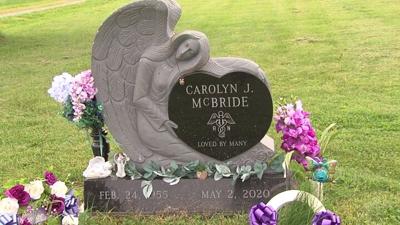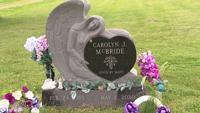AVA (WSIL) -- Like the historic Spanish Flu pandemic of 1918, the COVID-19 pandemic of 2020 will go down in history. It's impact is still being written as the death toll climbs.
For front line health workers who lost their life to the virus, their example will stand for generations. News 3's Maya Skinner has been following a local family dealing with such a loss.
Carolyn McBride was a nurse at a retirement home where she contracted the virus. She was hospitalized after feeling ill and passed away later that week.
One year later, her family says some days are harder than others.
"It's been rough. There's been many times that I've wanted to pick up the phone and call my mom and can't call her anymore," says McBride's daughter Shalla McBride. "My aunt tries to be there for us, but it's not the same."
Shalla McBride tells News 3 she had COVID-19 in December. Her sister, Sarah McBride, says the family are grieving other loses from the last year.
"First thing that hit in my head was, 'Great, now my mom, my sister-in-law, my boyfriend, here goes my sister.' And then our older brother just died in February. But his was probably diabetic-related," she says.
She says some days she barely leaves her room.
"I say a lot of times, I just kind of, sometimes for weeks at a time, maybe come out to go to the bathroom. The kids will be like, 'Mom when's the last time you ate? Mom, you drank anything?" she says.
The St. John Evangelical Lutheran Cemetery is where Carolyn McBride is laid to rest. Family members tell News 3 what they'll miss most is her being there for them.
"My mom was my best friend. If we had appointments for this one [my daughter] in St. Louis, my mom would always be there. And she's not anymore," says Shalla McBride.
Her granddaughter says she misses going to the zoo and shopping with her and even got a tattoo in her honor.
"I wanted the heart and the halo with the date to show she's an angel now and the wings just went along with it," says Czaria Bonnet.
The family hopes their story can be an encouragement to others.
"My heart's with you, my sympathy's with you. If you can get online, apply for the FEMA assistance for the funeral reimbursement," says Shalla McBride.
Her family is looking for help from the recently approved FEMA grant for burial reimbursement. The FEMA grant is part of the Coronavirus Response and Relief Supplemental Appropriations Act and the American Rescue Plan Act.
Its purpose is to provide financial assistance for COVID-related funeral expenses.
News 3 asked Centerstone's Julie Bailey if she could break down the term "grief" and what that could look like during this pandemic. She says grief is a natural process that everyone goes through when they have a loss and that could be a loved one, job or a home.
The normal grief process is sadness, crying, anger, denial, but complicated grief is when the struggle to move on affects our daily tasks for a long period of time. She says it's not good to hold our emotions inside and ignore what we feel.
"So often we're of the mindset that we should just suppress those emotions and we think that coping with it means that we don't express any emotion and that can prolong the grief process actually because we have to work through those things and just ignoring them doesn't always help us to work through them," Bailey says.
Bailey also says pay attention to your children after a loss because they can display their grief in different ways. Those include acting out or becoming distant.
Some tips that she shared to help those working through grief include: journaling, writing a poem, and doing things that your loved one would've liked to do.
She says sometimes, just talking about it can help too.














